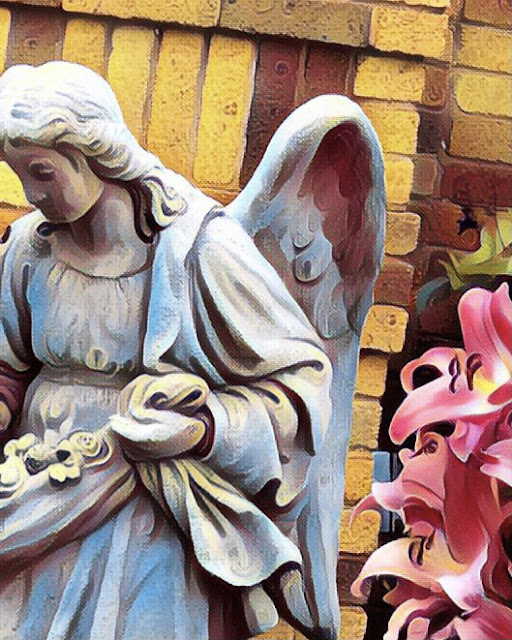Merton tries to avoid God's call . . .
And yet, what a strange admission! To say that men were admirable, worthy
of honor, perfect, in proportion as they disappeared into a crowd and made
themselves unnoticed, by even ceasing to be aware of their own existence and
their own acts. Excellence, here, was in proportion to obscurity: the one who was
best was the one who was least observed, least distinguished. Only faults and
mistakes drew attention to the individual.
The logic of the Cistercian life was, then, the complete opposite to the logic of
the world, in which men put themselves forward, so that the most excellent is the
one who stands out, the one who is eminent above the rest, who attracts
attention.
But what was the answer to this paradox? Simply that the monk in hiding
himself from the world becomes not less himself, not less of a person, but more
of a person, more truly and perfectly himself for his personality and individuality
are perfected in their true order, the spiritual, interior order, of union with God,
the principle of all perfection. Omnis gloria ejus filiae regis ab intus.
The logic of worldly success rests on a fallacy: the strange error that our
perfection depends on the thoughts and opinions and applause of other men! A
weird life it is, indeed, to be living always in somebody else’s imagination, as if
that were the only place in which one could at last become real!
With all these things before me, day and night, for two days, I finally came to
the afternoon of Good Friday.
After a tremendous morning of ten hours of practically uninterrupted chanting
and psalmody, the monks, exhausted, had disappeared from the scene of their
gutted church, with its stripped altars and its empty Tabernacle wide open to the
four winds. The monastery was silent, inert. I could not pray, I could not read
any more.
I got Brother Matthew to let me out the front gate on the pretext that I wanted
to take a picture of the monastery, and then I went for a walk along the enclosure
wall, down the road past the mill, and around the back of the buildings, across a
creek and down a narrow valley, with a barn and some woods on one side, and
the monastery on a bluff on the other.
The sun was warm, the air quiet. Somewhere a bird sang. In a sense, it was a
relief to be out of the atmosphere of intense prayer that had pervaded those
buildings for the last two days. The pressure was too heavy for me. My mind
was too full.
Now my feet took me slowly along a rocky road, under the stunted cedar
trees, with violets growing up everywhere between the cracks in the rock.
Out here I could think: and yet I could not get to any conclusions. But there
was one thought running around and around in my mind: “To be a monk ... to be
a monk...”
I gazed at the brick building which I took to be the novitiate. It stood on top of
a high rampart of a retaining wall that made it look like a prison or a citadel. I
saw the enclosure wall, the locked gates. I thought of the hundreds of pounds of
spiritual pressure compressed and concentrated within those buildings and
weighing down on the heads of the monks, and I thought, “It would kill me.”
I turned my eyes to the trees, to the woods. I looked up the valley, back in the
direction from which I had come, at the high wooded hill that closed off the
prospect. I thought: “I am a Franciscan. That is my kind of spirituality, to be out
in the woods, under the trees...”
I walked back across the trestle over the sunny, narrow creek, embracing my
fine new error. After all I had seen of the Franciscans, where did I get the idea
that they spent their time under the trees? They often lived in schools in towns
and in cities: and these monks, on the contrary, did go out every day and work in
the very fields and woods that I was looking at.
Human nature has a way of making very specious arguments to suit its own
cowardice and lack of generosity. And so now I was trying to persuade myself
that the contemplative, cloistered life was not for me, because there was not
enough fresh air....
Nevertheless, back in the monastery I read St. Bernard’s De Diligendo Deo
and I read the life of a Trappist monk who had died in a monastery in France,
ironically enough in my own part of France, near Toulouse: Father Joseph
Cassant.
The Retreat Master, in one of his conferences, told us a long story of a man
who had once come to Gethsemani, and who had not been able to make up his
mind to become a monk, and had fought and prayed about it for days. Finally,
went the story, he had made the Stations of the Cross, and at the final station had
prayed fervently to be allowed the grace of dying in the Order.
“You know,” said the Retreat Master, “they say that no petition you ask at the
fourteenth station is ever refused.”
In any case, this man finished his prayer, and went back to his room and in an
hour or so he collapsed, and they just had time to receive his request for
admission to the Order when he died.
He lies buried in the monks’ cemetery, in the oblate’s habit.
And so, about the last thing I did before leaving Gethsemani, was to do the
Stations of the Cross, and to ask, with my heart in my throat, at the fourteenth
station, for the grace of a vocation to the Trappists, if it were pleasing to God.
You can never escape God. God sort of chases you. Doesn't give up on you. Ever. That's what Merton learns at the end of this passage.
Sometimes, God puts things into your head that terrify or amaze you. Ideas or urges. For instance, tonight, I led a poetry workshop. I'd been trying to put it together for days--the poems and writing prompts. It finally came together this afternoon. In a matter of about 15 or 20 minutes. Now, some disciples of this blog will say that all of my struggle helped me to that moment of inspiration. I prefer to believe that it was a moment of grace. God reaching down and giving me a gift.
At the end of the workshop, God gave me another gift. A new poem. I haven't written a new poem in ages.
God doesn't give up on anybody. Even tired, grief-stricken saints like Marty.
Here's the new poem . . .
Thanksgivings
by: Martin Achatz
This is a poem of last suppers
that I didn't know were last suppers.
The day my brother came to my parents'
house to have pumpkin pie
after Thanksgiving because his wife
was Seventh Day Adventist, refused
to make the whole turkey smorgasbord.
And pumpkin pie was his favorite.
He ate it with Cool Whip, went home,
was gone five months later.
Or my sister in the hospital, how I fed
her strawberry frozen custard. She smiled
at me like a guilty child. Four months
later, she took her last bite of air.
For my father, it was a McDonald's
cheeseburger, large fries, vanilla
milkshake. The following day,
my mother held his hand, told him
he'd been a good husband,
and he slipped out the door. Now,
my mother. I remember the last
Thanksgiving, how she ate a piece
of pecan pie, forgot she had eaten,
ate another because why not?
Gone four weeks before turkey,
stuffing, mashed potatoes, pecan
pie. All these last suppers, as holy
as any bread or wine. I gospel
them here, make them into psalm,
lamentation. Because, really,
aren't all family dinners like that?





